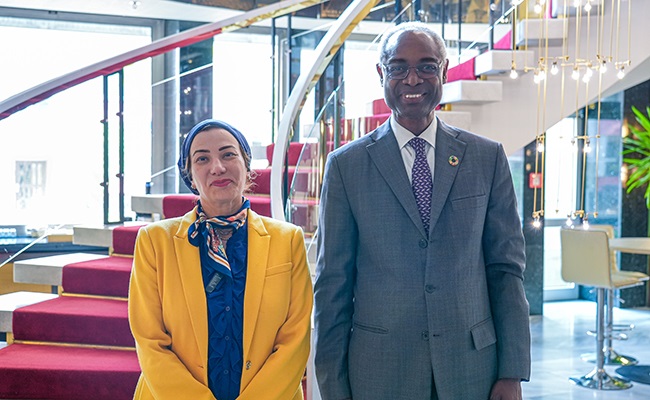The United Nations Convention to Combat Desertification (UNCCD) on Tuesday, August 5, 2025, marked a historic leadership transition as outgoing Executive Secretary, Ibrahim Thiaw, handed over responsibilities to Yasmine Fouad, former Minister of Environment of Egypt, at the Convention’s secretariat headquarters in Bonn, Germany.
A Mauritanian national, Thiaw led the UNCCD secretariat since 2019, having served the environment movement for more than 40 years, the last 12 with the United Nations. Under his leadership, the Convention advanced in its mission to protect people and ecosystems by restoring our land and ensuring a safer, just, and more sustainable future.

While land degradation and desertification are perceived as insurmountable challenges, the UNCCD has proved that land restoration unlocks multiple solutions. There are few places on earth where this is truer than in Africa’s Sahel, the (greater) Middle East and Central Asia.
The UNCCD has thus supported Parties in need develop and carry out large-scale restoration activities, such as the Great Green Wall(s) in Africa or the Middle East Green Initiative. Bringing degraded land back to health generates more food on the table, stabilizes economies and societies, combats climate change and restores water and biodiversity. The G20 Global Land Restoration Initiative also contributes to such effort.
The last four years have seen an awakening in the need for stepped up global efforts to build resilience to increasingly frequent and intense droughts, culminating in the launch of the International Drought Resilience Alliance in 2022 and the Riyadh Global Drought Resilience Partnership in 2024, backed by strong political and financial commitments.
Human face: The mandate of the UNCCD cut across human wellbeing and ecosystem protection in a context of vulnerability or scarcity. In that context, local communities, small holders, youth women and indigenous people have been at the center of the attention. At UNCCD COP16, UNCCD Parties took bold decisions to ensure meaningful participation of Indigenous Peoples, local communities and youth in the Convention’s processes. Advancing women’s land rights has been the focus of the UNCCD’s advocacy work, building on the Convention’s strong record in promoting gender equality.
Public-private partnerships: While commendable progress has been made thanks to public investments, a UNCCD study conducted by the UNCCD in 2024 revealed that investments made by the private sector in land restoration represent just 6 per cent of the total. To mobilise private sector investment in support of land restoration and drought resilience, UNCCD has therefore forged cooperation frameworks with institutions such as the World Economic Forum and launched the Business4Land Initiative.
Science-policy dialogue: The UNCCD strives to make decisions, and propose policies backed by science. In that context, building a stronger Science-Policy Interface was essential. COP16 gave mandate for a stronger voice of science in decision-making.
Outgoing Executive Secretary, Ibrahim Thiaw, said: “I’ve witnessed firsthand how degraded land turns into restored landscapes and revived livelihoods—this transformation inspired every step of my journey. I am proud to have led the UNCCD Secretariat in changing the world’s perspective from land as a problem, to land as one of the most powerful solutions for sustainable development. I thank the UNCCD Parties for their support and warmly welcome the next Executive Secretary Yasmine Fouad, to whom I entrust a stronger and more inclusive secretariat with renewed momentum.”
Yasmine Fouad, who served since 2018 as Egypt’s Environment Minister, brings over 25 years of environmental diplomacy experience at the intersection of climate, biodiversity, and sustainable development, having chaired CBD COP14 and served as Envoy for UNFCCC COP27, leading negotiations on climate finance and nature-based solutions.
Incoming UNCCD Executive Secretary, Yasmine Fouad, said: “I am deeply honored to take up this mantle and thank my predecessor Ibrahim Thiaw for his invaluable contribution to the Convention and broader sustainable development agenda of the United Nations. Building on UNCCD’s 30-year-strong legacy, I will champion integrated solutions across land, climate and biodiversity and committed to build with all parties and stakeholders ambitious comprehensive post-2030 targets.
“Together, the UNCCD will deepen partnerships, amplify voices of the most affected, and drive bold actions to heal our lands, build resilience to droughts, restore our ecosystems and secure people’s futures.”
